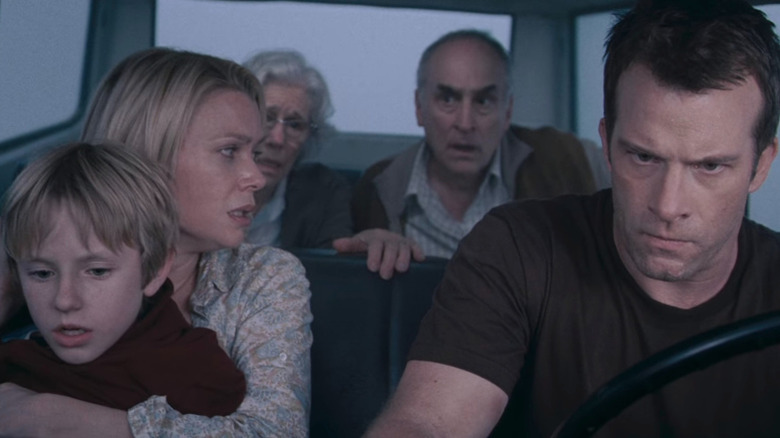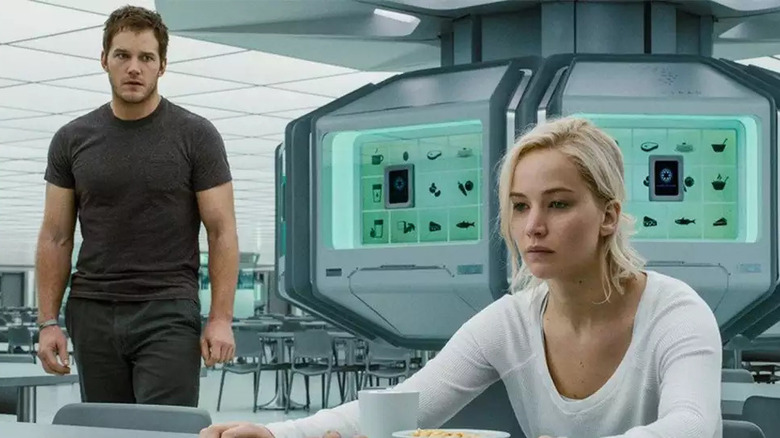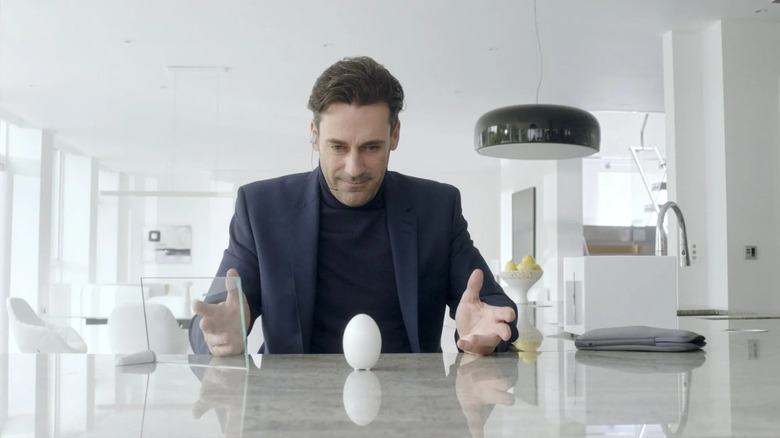Thomas Jane Questions If The Mist Could Keep The Same Controversial Ending Today
The ending to "The Mist" still hurts. After being trapped in an all-encompassing fog filled with giant Lovecraftian monsters, David Drayton (Thomas Jane) and the other survivors finally give up hope. David uses his gun's remaining bullets to kill his son and the other survivors. He steps out of his car to accept his demise, only for the mist to suddenly disperse. Turns out, the military's gotten the situation under control, and if David had waited 30 seconds, they all would've been perfectly safe. It seems that nearly every decision David's made has brought him further into the mist, making his situation worse than it needed to be.
If you're having trouble understanding how much this realization stung for poor David, imagine you're at a grocery store and there are only two checkout counters available. One of the lines to the checkout counters seems way shorter than the other, so you pick that one, only to watch helplessly as the longer line flies by while you're stuck waiting behind a single slow-moving customer who's paying entirely with coins. Well, Drayton's situation is basically that, only way, way worse.
The ending is the most famous thing about "The Mist," not in spite of but because of how delightfully mean it all is. Thomas Jane, however, isn't sure if they would've been able to get away with such a conclusion today. "I know [director] Frank Darabont was offered more money, like double the budget, if he'd have just changed the ending," he explained in a Daily Dead interview. "And we all said, 'No, we'll take less money.' [...] I don't know if you could get away with a 'Mist' today, it might be tough, but we snuck that one in and we're proud of it."
Why he might be right
This isn't the first time this sort of claim has been made about a Frank Darabont movie. The director himself once speculated that "The Shawshank Redemption" couldn't have been made today either, albeit for slightly different reasons. His explanation for "Shawshank" centered around how slow and thoughtful the film was, whereas Jane's concerns about "The Mist" is more to do with the movie's downer ending.
The common wisdom, after all, is that audiences prefer happy endings. It's why everyone's still mad at "How I Met Your Mother" for going way darker than anyone expected with its finale, or maybe why the writers of "Scream 4" almost had the killer get away with it but were forced to rewrite the ending. It's why you may often find yourself watching a movie that feels like it's going in a dark, potentially traumatizing direction, only for it to finish off with an "everything's fine" final scene that doesn't feel earned.
The 2016 film "Passengers" is a famous example of this. As has been pointed out by many viewers, this could've easily been a horror story about Aurora (Jennifer Lawrence) being woken up on an empty spaceship with no one else but a stranger named Jim (Chris Pratt) and slowly figuring out that he's the one who doomed her in the first place. A "Twilight Zone"-style ending could've fit this story perfectly, but the movie chose a safe, generic happy ending instead. It makes sense, in a way: as a completely standalone original movie in a landscape of franchises and adaptations, "Passengers" was already a big risk. A bold, feel-bad ending could've been seen as pushing things too far.
Why he might be wrong
But although the common wisdom seems to be that happy endings go down better with audiences, is that actually true? The popularity of shows like "Black Mirror" in the 2010s (and of course "The Twilight Zone" in the '60s) indicate that a lot of us viewers actually enjoy getting tortured by the things we watch.
Yes, both of those anthology shows threw in the occasional happy ending, but the most famous "Twilight Zone" episode is the one where that guy breaks his glasses right after the apocalypse finally gives him time to read. One of the most famous "Black Mirror" episodes similarly ends with a guy's consciousness being trapped inside a small room, forcing him to listen to the same song on a loop for a near-eternity.
Dark, twisted endings don't just happen on TV either. Films like "Ex Machina," "A Clockwork Orange," "Hereditary," and "Requiem For a Dream" are beloved and respected precisely because of how willing their endings are to not pull any punches. They've got the sort of conclusions that get people talking, that keep viewers thinking about the story years after it ended. As recently as 2022, "Smile" proved that a downer ending didn't mean a movie couldn't be a financial success.
Maybe from a studio's perspective beforehand, "The Mist" would've been a safer bet if it had stuck to the novel's more hopeful ending. But looking back at the iconic horror film's reputation over 15 years later, it seems Frank Darabont's meaner, soul-crushing ending was the better choice, even if you're of the mind that profit is all that matters.


